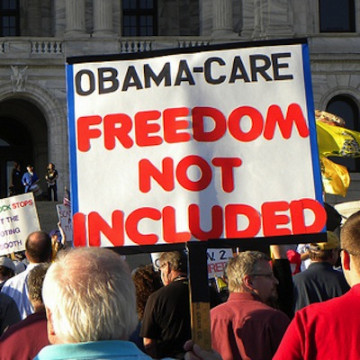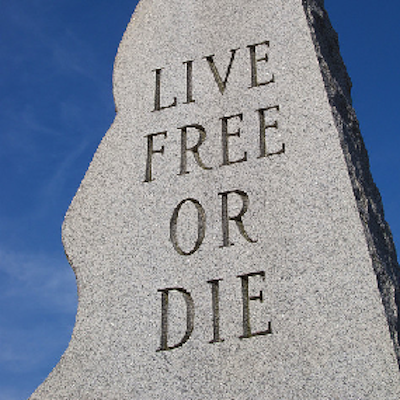Arthur Schaper: ObamaCare-Less in RI
Friday, March 14, 2014
The Affordable Care Act’s careless implementation and uncaring implications have exposed that Obama-Care-Less about the health and wealth of Rhode Islanders, believes Arthur Schaper.
In Maryland and Oregon, legislators are scrambling to make up for never-ending computer glitches, which have drastically reduced the number of people whom state leaders were expecting to sign up.
CNN reported on the rising demand coupled with the increasing shortage of doctors in the wake of Obamacare’s rollout. A rural doctor and other specialists are boycotting the “most successful” state exchange Covered California. Other agents signaled a growing backlash to receiving patients enrolled in the state exchanges. Even an LA Times article challenging the argument that seven out of ten doctors were boycotting the California exchange, acknowledged about one hospital that “there are reports that some may see patients only in non-exchange plans”.
GET THE LATEST BREAKING NEWS HERE -- SIGN UP FOR GOLOCAL FREE DAILY EBLASTCNBC reported a federal study, which determined that two-thirds of small businesses will size rise in health care premiums because of Obamacare.
What about Rhode Island? RIPR exposed that the state exchange has not taken in nearly enough healthy, young people, the bulk of whom would subsidize the poor and sick flocking to the program.
Dr. Dan Harrop, associate medical director for Aetna Heath, acknowledged that Obamacare enjoyed some popularity: “Clearly there are people who are able to get insurance who could not get it before.” Still working part-time as a psychiatrist, Harrop added: “I have more business because of Obamacare.” He then acknowledged that the program was unsustainable:
“I can tell you the trends that are bad for the whole program. Don’t worry about the insurance companies. They will eventually make a profit. The issue is how much the government will have to underwrite these insurance plans.”
Sharing personal anecdotes of people who lost their health insurance, doctor, or hospital of choice, Harrop affirmed that without young and healthy people signing up, the whole system will collapse.
Go Local Prov Health/Business expert Amy Gallagher works as a benefits administrator, and she had nothing but bad news about Obamacare, citing businesses would face rising premiums beyond the normal 7%. “A defense contract based in Rhode Island will face a 26% hike in health insurance premiums because of this law.” She further commented on other statewide firms which face no other option beyond raising the insurance premiums on their employees just to manage the costs associated with Obamacare. She did not disclose specific names, for fear that those firms would face political retaliation, like losing key contracts with the state.
Beyond the statements of the benefits administrator, General Assembly legislators are sounding the alarm about Rhode Island’s embattled, unsustainable healthcare exchange, Health Source RI.
Patricia Morgan (R -West Warwick) investigated the Governor’s budget to find expenses related to the health exchange. Despite the initially projected cost of $23 million per year, Morgan discovered costs for media, the call center, and the staff which amounted to $35 to 38 million. Morgan shared another open yet secreted aspect of the budget: "There's twelve jobs in one line time: $2.2 million, and $1.3 million for fifteen more, all for the health care exchange, with average salaries of $146,700 and $108,300." Then she added: “The names of the jobs are not listed in the budget.”
Because of the exceeding costs of the exchange, in conjunction with structural deficits expected to rise from $150 million to $450 million in four years, Morgan submitted H7817, which would mandate that no state funds would support the health exchange.
Cosigning the legislation, Assemblyman Jan Malik (D-Warren) stated: “I just don’t think we can afford it because of the situation we are in right now. Let the feds pay for it.” Making a point that the costs of the state healthcare exchange would increase substantially over the next four years, Malik rejoined: “The issue for me is the dollars and sense. If we could afford it, we should keep it.”
Eleven cosponsors signed on to H7817, including Arthur Corvese (D-North Providence), Ray Hull (D-Providence), Michael Chippendale (R-Johnston) and John DeSimone (D-Providence).
Responding to a telephone inquiry, Chippendale commented that as a member of a permanent joint committee on health care oversight, “It became clear to me that it was nothing but smoke and mirrors. This committee had no say on really anything that the lieutenant governor was doing to set up the exchange.”
About the impact of Obamacare on his constituents, Chippendale added:
“Insurance is being dropped. Some of the elderly are starting to see gaps in their Medicare coverage that didn’t exist before, that now suddenly do. Businesses are frantic. They simply cannot afford to put their employees on these very expensive health care plans.”
Despite claims for accessibility and affordability, from rising health care costs to spiraling government debt, the Affordable Care Act’s careless implementation and uncaring implications have exposed that Obama-Care-Less about the health and wealth of Rhode Islanders.
Arthur Christopher Schaper is a teacher-turned-writer on topics both timeless and timely; political, cultural, and eternal. A life-long Southern California resident, Arthur currently lives in Torrance. Follow him on Twitter @ArthurCSchaper, reach him at [email protected], and read more at Schaper's Corner and As He Is, So Are We Ministries.
Related Slideshow: New England’s Healthiest States 2013
The United Health Foundation recently released its 2013 annual reoprt: America's Health Rankings, which provides a comparative state by state analysis of several health measures to provide a comprehensive perspective of our nation's health issues. See how the New England states rank in the slides below.
Definitions
All Outcomes Rank: Outcomes represent what has already occurred, either through death, disease or missed days due to illness. In America's Health Rankings, outcomes include prevalence of diabetes, number of poor mental or physical health days in last 30 days, health disparity, infant mortality rate, cardiovascular death rate, cancer death rate and premature death. Outcomes account for 25% of the final ranking.
Determinants Rank: Determinants represent those actions that can affect the future health of the population. For clarity, determinants are divided into four groups: Behaviors, Community and Environment, Public and Health Policies, and Clinical Care. These four groups of measures influence the health outcomes of the population in a state, and improving these inputs will improve outcomes over time. Most measures are actually a combination of activities in all four groups.
Diabetes Rank: Based on percent of adults who responded yes to the question "Have you ever been told by a doctor that you have diabetes?" Does not include pre-diabetes or diabetes during pregnancy.
Smoking Rank: Based on percentage of adults who are current smokers (self-report smoking at least 100 cigarettes in their lifetime and currently smoke).
Obesity Rank: Based on percentage of adults who are obese, with a body mass index (BMI) of 30.0 or higher.
Source: http://www.americashealthrankings.org/
Related Articles
- Arthur Schaper: DePetro Boycott and Exeter Recall (Oh Boy!)
- Arthur Schaper: Langevin Quotes (Racist, Statist) Woodrow Wilson
- Arthur Schaper: RI Senators: Stop the Shutdown (Oh Please!)
- Arthur Schaper: Speaker Fox In The Hen House
- Arthur Schaper: Dr. Dan: The Right Prescription For Providence
- Arthur Schaper: Libertarianism: The Heart of Conservatism
- Arthur Schaper: RI Taking Out Trash for New Year
- Arthur Schaper: Takers Get Taken, Makers Make It
- Arthur Schaper: Fung: Full Disclosure on Funding and Failures
- Arthur Schaper: Lincoln Chafee—Faux Republican, Nouveau Democrat
- Arthur Schaper: Reid and Reed’s ObamaCare Screeds
- Arthur Schaper: The Politics of 38 Studios: Junk
- Arthur Schaper: Gay CounterMentum
- Arthur Schaper: Politics: A Matter of the Heart
- Arthur Schaper: Rev. Tobin Joins the GOP (Hallelujah!)
- Arthur Schaper: What Would You Say To Them, Treasurer Raimondo?
- Arthur Schaper: Gina Raimondo, You KO’d My 401(k)!
- Arthur Schaper: RI Education: End the Pillage, Restore The Village
- Arthur Schaper: Rhode Island + CA: Two States In A Bad State
- Arthur Schaper: Whitehouse’s GOP Forecast: Sunny Skies
- Arthur Schaper: Guns, Prizes, and the Dems’ Wedge Issues
- Arthur Schaper: RI GOP Needs To Channel Its Inner Elvis
- Arthur Schaper: Rhode Island General Assembly: Lower My Taxes!
- Arthur Schaper: Who’s Pushing the DePetro Boycott?
- Arthur Schaper: An Anti-Tribute To RI Gov. Lincoln Chafee
- Arthur Schaper: Harrop, Hispanics, and How to Help RI GOP
- Arthur Schaper: RI GOP Should Get High…Really
- Arthur Schaper: Round, Rhode Island, GOP + School Choice
- Arthur Schaper: Why Gina Raimondo Should Sue Jerry Brown
- Arthur Schaper: Chafee’s Budget – A Pie in the Sky Dream
- Arthur Schaper: Improvident Providence
- Arthur Schaper: RI Reclaims Christmas Tree
- Arthur Schaper: Shout Out to the RI General Assembly















